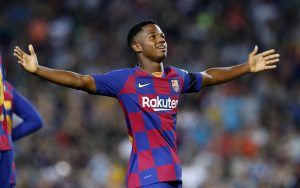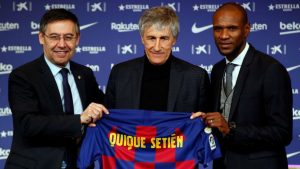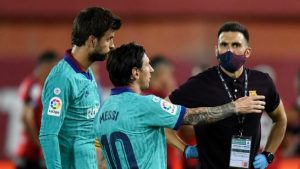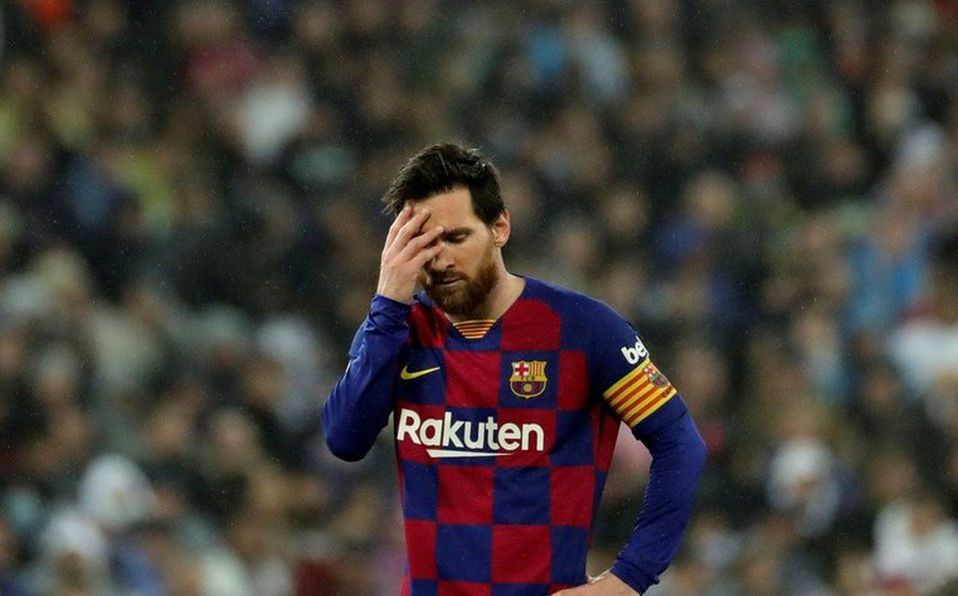Following a trophyless season, there’s little hope for Barcelona concerning the Champions League. The European competition will return in 10 days, as Barça will face Napoli. While all are waiting for the Champions League, we have decided to review the season.
Following the catastrophic 0-4 loss at Anfield in the Semi-finals of the Champions League in 18/19, culés were left empty for the 19/20 season. Many culés had little hope, yet the board did sign two important players: Frenkie De Jong, from Ajax and Antoine Griezmann, from Atlético De Madrid, one year after releasing the documentary ‘The Decision’. Firpo, Neto were brought in as well, while Malcom, Samper departed. It’s with a fairly strong squad that Barcelona went in the 19/20 season, with Valverde as manager.

However, things didn’t turn out the right way from the very beginning. Injuries first kept Messi, Suarez, Dembélé out. If the injuries seemed problematic, Barcelona was lucky enough to find in Ansu Fati the revelation of the season, even if Rafinha had been important as well. The latter finished the season at Celta, though. Ansu Fati must be the player that has to be talked about. The 17 year old took by storm the first team, exceptionally skipping the B team. From his very first matches, Ansu found the net. Despite the promising Fati, Barça struggled throughout the season. Irregularity plagued Valverde’s team, especially in away games, as seen against Granada (0-2 Loss) or against Osasuna (2-2 draw). Even worse, Barcelona was dominated at the Camp Nou by archrivals Real Madrid, despite the 0-0 draw. Perhaps, the culmination of Barcelona’s struggles had been in January: Following Barcelona’s exit from the Supercopa, Valverde was fired after almost three years at Barcelona. For the fans, this meant the start of new hopes.
Unfortunately, culés fell in love with Quique Sétien. The former Betis manager was appointed mid-season, but more importantly, promised something he couldn’t promise: The return of Cruyffism at Barça. Sétien famously said: “With me, the youngsters will get chances. If first team members will fail to play, they will be benched. I believe in meritocracy” Multiples interviews followed. All of them gave hopes to Culés, following almost three years of Valverde’s pragmatism. Alas, things didn’t turn out as bright. Sétien didn’t entirely deliver his promises, but did fairly well in his first match against Granada. A 1-0 win that saw Barcelona play in a 3-5-2 system with Roberto a RCB, a new idea for the culés.

If he did fairly well in his first match, things started to turn gloomy as matches followed: An unconvincing performance against Ibiza, the quarterfinals exit in the Copa Del Rey following the 0-1 loss against Athletic Club: Things started to become worse. Madrid, on their side, regained the position as leaders. Suárez’s absence hurt Sétien too, who could only use Suárez months later, who had a good start of the season. Barcelona managed to regain the leader status thanks to Madrid’s fall against Betis. After that? The coronavirus hit Sétien. In his first months as Barcelona manager, Sétien was unlucky enough to deal with Luisito’s injury, the coronavirus pandemic and internal problems.
Indeed, if Barcelona’s problems were numerous on the pitch, off the pitch problems appeared. In February, the ‘Barçagate’ scandal was revealed under the public eye by Cadena SER. A scandal that involved the company I3 Ventures, who had been paid by Barcelona’s board, to spread negative sentiments about numerous important figures. Amongst them, the names of Piqué, Messi, Victon Font and even Puyol were to be found. If PwC’s audit reports confirmed months later that most of the allegations were not true, the scandal shook the club without a doubt.
The scandal wasn’t going to be Barcelona’s only problem: 6 board members were fired by Bartomeu. Messi, one his side, clashed with Abidal, who claimed players were ‘lazy’ under Valverde. In other words, Barcelona’s main problems weren’t on the pitch, but off the pitch. Internal issues multiplied, Pep Segura was fired. So was Valdés, only a few months after arriving as youth coach, following disputes with Justin Kluivert, the new La Masia director.
The break didn’t change much of the mood. After the restart in June, Quique’s criticism grew from the fans. Barcelona first dropped points against Sevilla in a dull draw. Only one pint separated Madrid from Barcelona, meaning Barcelona had to win all games – Another draw could cause the League’s loss. Whilst Madrid continued winning every game, Barcelona dropped points another time, against Celta and later Atlético. The League wasn’t in Barcelona’s hands anymore, but in Madrid’s: Should they win all the games, they will be crowned champions. History proved later this to happen, as Madrid won against Villarreal in the 36th matchday.
Pessimism invaded Barcelona. Little motivation there was, following little hopes for the much coveted Champions League. Sétien experienced his first Champions League game in February, against Napoli. Not a pleasant way to discover the competition, as a lack of width – a recurrent problem since Neymar left – proved to be problematic, despite the match ending in a 1-1 draw. For Barcelona, this could be the first trophyless season in 12 years, a rarity for the Catalans.
For Quique, though, life is very hard. Following failures in La Liga, his job is at stake. Not only do the directives not seem to trust him, but there seem to be a problem in the dressing room. Most still remember the incident with Eder Sarabia, who was seen as too charismatic. Players had been seen ignoring Sétien and Eder. Amongst those, none other than Lionel Messi and Luis Suárez, Barcelona’s two superstars.

Signings weren’t the most successful either. If Frenkie did fairly well despite disappointing in the first semester, there was a big problem: Antoine Griezmann. Unto this day, the French superstar hasn’t found his role in this team. Multiple solutions had been tried: Valverde tries him at the left wing. Result? An absolute failure, which saw Griezmann ghosting for many, many matches. An unacceptable problem considering the 120M fee paid by Barcelona in order to get the player’s service. Under Sétien, the 9 position hasn’t worked for him either. Only the 4-3-1-2 formation has worked against Villarreal, but failed against Espanyol. One years after his arrival, Griezmann still doesn’t have a fixed position.
Finally, one big signing made noise: The Arthur-Pjanic swap. Loved by the fans, Arthur Melo enjoyed a fairly good run in October and in November, benching Rakitic in the process. Injuries plagued him, but the support was there. The one who was said to be the next Xavi – the latter recognizing it himself – was not only benched and ignored by Sétien, but subsequently bullied out of the club. Juventus pressured him, just like Bartomeu’s board. Initially against it, Arthur finally complained. For many, this is an outrageous transfer, only motivated to balance the books. Sportively, swapping a 23 year old for a 30 year old doesn’t make much sense.
This season is a season to forget. Not only did Barça fail to deliver on the pitch – on results or on style – but faced too many internal issues. The culés will hope the next season will bring something better.
[/et_pb_text][/et_pb_column][/et_pb_row][et_pb_row column_structure=»2_5,3_5″ _builder_version=»3.27.1″][et_pb_column type=»2_5″ _builder_version=»3.27.1″][/et_pb_column][et_pb_column type=»3_5″ _builder_version=»3.27.1″][et_pb_team_member name=»Iliev Kai» position=»Colaborador» _builder_version=»4.4.9″ header_level=»h5″ header_font=»|600|||||||» header_text_color=»#333″ header_font_size=»16″ body_text_color=»#0e30f2″ body_font_size=»12″ custom_padding=»0px|||||» hover_enabled=»0″][/et_pb_team_member][/et_pb_column][/et_pb_row][/et_pb_section][et_pb_section fb_built=»1″ disabled_on=»|on|on» _builder_version=»3.27.1″ use_background_color_gradient=»on» background_color_gradient_end=»#dd2e2e» background_color_gradient_direction=»135deg» background_image=»https://el10delbarça.com/wp-content/uploads/2019/11/3057190-01.jpg» background_blend=»soft-light» max_height=»414px» custom_margin=»20px||||false|false» custom_padding=»0px||||false|false» z_index_tablet=»500″ box_shadow_horizontal_tablet=»0px» box_shadow_vertical_tablet=»0px» box_shadow_blur_tablet=»40px» box_shadow_spread_tablet=»0px»][et_pb_row _builder_version=»3.27.1″ max_height=»406px»][et_pb_column type=»4_4″ _builder_version=»3.27.1″][et_pb_slider _builder_version=»3.27.1″ header_level=»h3″ background_color=»rgba(0,0,0,0)» background_color_gradient_direction=»135deg» background_enable_image=»off» max_height=»383px» custom_padding=»10px||10px||false|false» animation_style=»fade»][et_pb_slide heading=»Fundación Eric Abidal» image=»https://el10delbarça.com/wp-content/uploads/2018/03/AbidaLogo3.png» _builder_version=»3.27.1″ header_level=»h3″ header_font_size=»40px»]El 10 del Barça colabora con la
Fundación Eric Abidal
El 10 del Barça colabora con la
Fundación Eric Abidal



